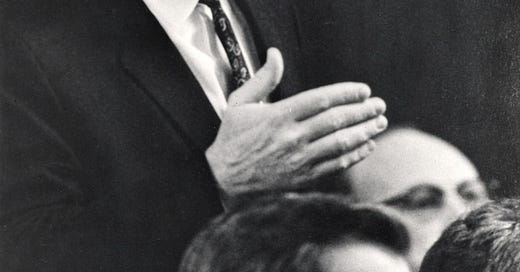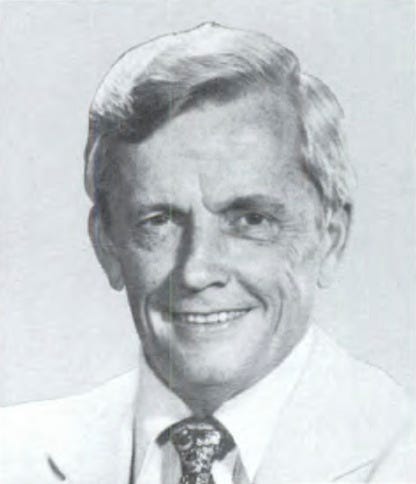Given that ever since October 7, 2023, the news has increasingly been on Israel and most recently the US bombed Iran nuclear sites with special bunker buster weapons that Israel doesn’t have, I thought it would be interesting to highlight the career of a politician who was increasingly critical of Israel and also underwent a considerable change in his political thinking overall.
In 1960, a number of significant freshmen from the Republican side of the aisle were elected to Congress: Bob Dole of Kansas, John Anderson of Illinois, Charles Mathias of Maryland, John Ashbrook of Ohio, William Scranton of Pennsylvania, and Robert Stafford of Vermont. Of these, Mathias, Scranton, and Stafford represented the moderate to liberal wing of the party while Dole, Anderson, and Ashbrook were of the conservative wing. Anderson would shift to the former camp by the Nixon Administration. One of the most interesting ones, however, was Paul Findley (1921-2019) of Illinois.
Findley in his early years in the House.
In his first four years of Congress, Findley was almost indistinguishable from the most conservative of Republicans. In 1962, he managed to put a major dent in the Kennedy program when he successfully killed the administration’s feed grain proposal, which was recommitted by ten votes. In 1966, Findley pushed against the Johnson Administration giving food for peace funds to Yugoslavia while it was providing food aid to North Vietnam. He opposed the space program on cost grounds, voted against the Peace Corps, and voted against Medicare. Findley even voted against educational television, which got the vote of the notorious penny-pincher H.R. Gross of Iowa. As he noted in 2013 about his record back then, “I believe I voted against everything. My voting record the first two years in the House showed…Well, one of the professors at Illinois College, Joe Patterson Smith, said to his friends that I was a Neanderthal, and I was. I was; there’s no doubt about it” (DePue, 81). Findley was scored a 100% by the conservative Americans for Constitutional Action in 1961 and 1962, the same as John Birch Society members John Rousselot and Edgar Hiestand of California and exceeding that of Orange County’s resident arch-conservative James B. Utt, who scored a 96%. His first vote in which he diverged from conservatism by ACA was his vote for the Civil Rights Act of 1964. Race never seemed to be an issue for Findley, as he noted, “I shared a desk with a black girl in first grade. It didn’t strike me as strange that we had blacks. I accepted them” (DePue, 13). In 1965, he appointed Frank Mitchell, the first black House page, with the cooperation of Minority Leader Gerald Ford and Minority Whip Leslie Arends.
Findley’s support for civil rights extended to fair housing legislation and by the 1970s he was opposing many proposals to curb busing. Although his conservatism persisted throughout the Johnson Administration, his record took a turn for the moderate during the Nixon Administration and there it stayed. Findley backed Nixon’s proposal for guaranteed minimum income for working families and at times he was critical of the Nixon Administration’s approach on Vietnam. In 1973, he was the central author of the War Powers Resolution, which was an attempt by Congress to reassert power over the use of the military. Findley also proved to be pro-choice and regularly voted against abortion restrictions. His position on the minimum wage also underwent a change as he backed a minimum wage increase over President Nixon’s veto in 1973 while he had opposed significant minimum wage increases in 1961 and 1966. Although by the 1970s he was a moderate, he still did push some conservative proposals, such as work requirements for food stamps and limiting Occupational Safety and Health Administration coverage. However, by the late 1970s Findley would become foremost known for his stance on Middle Eastern politics.
Findley Becomes a Critic of Israel, Has Mixed Feelings About Reagan
Paul Findley had initially been supportive of Israel, including voting against a proposal in 1976 that would have stripped an export administration extension of provisions that served to prevent US companies from going along with an Arab boycott of Israel. In 1978, he met Yasser Arafat on a trip to Damascus, Syria as a member of the Foreign Relations Committee. Findley walked away so impressed by what he thought was Arafat’s commitment to peace in the region that he became a critic of Israel on the Israel-Palestine conflict. His criticisms grew with time, including calling for stopping aid to Israel. Findley even called himself “Arafat’s best friend in Congress” (Schnazer).
Findley in 1979.
In 1980, Findley initially endorsed fellow Illinois Congressman John B. Anderson, who had a similar ideological trajectory to him, in the Republican primary, but he would support Reagan after he dropped out. His support of Arafat was starting to cause him some political trouble, and he was finding it increasingly difficult to get prominent Republicans to campaign with him. Findley recalled that initially former President Gerald Ford was going to make an appearance with him, but dropped out as his staff claimed that he had a prior engagement, but the truth is that there was no prior engagement, and Ford would later give him the straight dope over the phone, “Paul, I’ve got to be up front with you. I’ve got to be candid. My problem is your relationship, your activities with the PLO and Arafat” and proceeded to tell him given President Reagan’s denunciation of Carter for refusing to designate the PLO as a terrorist group, “I’m trying to help Reagan. If I come out and support you, at every press conference, I will be badgered and dogged with the question of how I could campaign for Reagan and then go and support Findley with his views on the PLO” (Findley, 21). He was not particularly gung-ho about Reagan and he was one of the last Republican representatives to be persuaded to vote for the Reagan tax cuts. Findley did, however, support Reagan’s sale of AWACs to Saudi Arabia in 1981 despite strong opposition from Israel. The conservative Americans for Constitutional Action gave him scores of 58% in 1981 and 48% in 1982, a far cry from his 100% in 1961 and 1962.
In 1982, Findley faced a strong challenger in Democrat Dick Durbin, who hit him on his support for the Palestinian side of the ongoing Israel-Palestine conflict, stating “He is totally out of step on the issue. What President Reagan recognizes–what everybody but Paul Findley recognizes–is that the PLO is a force for instability in that region, not a liberation group” (Bohlen). Findley indeed thought differently. He stated before a class of college students that year, “Arafat is, I think, a very practical man who can adjust to reality if it is the only way to get a Palestinian homeland under way” (Bohlen). Redistricting wasn’t helpful for him nor was the recession, and he lost reelection by less than a point. Ideologically, Findley supported the position of the conservative ACA 70% of the time, the liberal Americans for Democratic Action 35% of the time, and his DW-Nominate score was a 0.246. Durbin today serves as Senate Minority Whip. Findley subsequently wrote They Dare to Speak Out (1985), in which he critiqued what he considered the excessive influence of Israel on U.S. foreign policy. He was agnostic on whether AIPAC made the difference in his defeat, noting “In a vote that close, almost any negative development could account for the difference. The attack by pro-Israel activists was only one of several factors” (Findley, 21). A second edition was published in 1989 and a third in 2003.
Much of Findley’s post-Congressional political activities centered on criticism of Israel. In 2002, he came out against invading Iraq and attributed 9/11 to the US’s continued support of Israel in the Israel-Palestine conflict, stating “Nine-eleven would not have occurred if the U.S. government had refused to help Israel humiliate and destroy Palestinian society” (Schnazer). Findley also attributed the invasion of Iraq to Israel’s influence. He died on August 9, 2019, at the age of 98. Former Representative John Napier (R-S.C.) recalled him positively, “We did not always agree. But he was a thoughtful person, and I admired his independence. When we disagreed, we did so agreeably, never in a disagreeable way. That, I believe, is the hallmark of statesmanship. He was a wonderful congressman who represented his constituency in an honorable manner” (Gizzi). Something interesting to note is that Findley wasn’t exactly alone in his criticisms of Israel; Senator J. William Fulbright (D-Ark.), one of the nation’s foremost postwar internationalist politicians who chaired the Foreign Relations Committee from 1959 to 1974, was critical of efforts of Israel’s supporters in the United States to influence foreign policy as well as supporters of any other nation. Charles Percy (R-Ill.), who chaired the Foreign Relations Committee from 1981 to 1985, was strongly opposed by AIPAC for reelection for crossing them too many times and he was narrowly defeated.
6/26/25 Correction: Findley pushed against food for peace for Yugoslavia in 1966, not 1963. In 1963, he had strongly backed an amendment that if enacted would have canceled US-guaranteed wheat sales to the USSR and Hungary.
References
ADA Voting Records. Americans for Democratic Action.
Retrieved from
https://adaction.org/ada-voting-records/
Bohlen, C. (1982, October 31). The 1982 Elections: The Illinois 20th District Race. The Washington Post.
Retrieved from
THE 1982 ELECTIONS: THE ILLINOIS 20TH DISTRICT RACE – The Washington Post
DePue, M. (2013, January 15). Interview with Paul Findley. Abraham Lincoln Presidential Library.
Retrieved from
Click to access Findley_Pau_4FNL.pdf
Findley, P. (1989). They dare to speak out: people and institutions confront Israel’s lobby. Brooklyn, NY: Lawrence Hill Books.
Retrieved from
https://eaford.org/site/assets/files/1023/they_dare_to_speak_out_paul_findley.pdf
Findley, Paul. Voteview.
Retrieved from
https://voteview.com/person/10517/paul-findley
Gizzi, J. (2019, August 16). Remembering Ex-GOP Rep. Paul Findley, Friend of Arafat. Newsmax.
Retrieved from
Remembering Ex-GOP Rep. Paul Findley, Friend of Arafat | Newsmax.com
Schnazer, J. (2019, September). The Congressman Who Hated Israel. Commentary Magazine.
Retrieved from
The Congressman Who Hated Israel
Seelye, K.Q. (2019, August 14). Paul Findley, Congressman Behind War Powers Act, Dies at 98. The New York Times.
Retrieved from
https://www.nytimes.com/2019/08/13/us/politics/paul-findley-dead.html





I remember him. Good article.